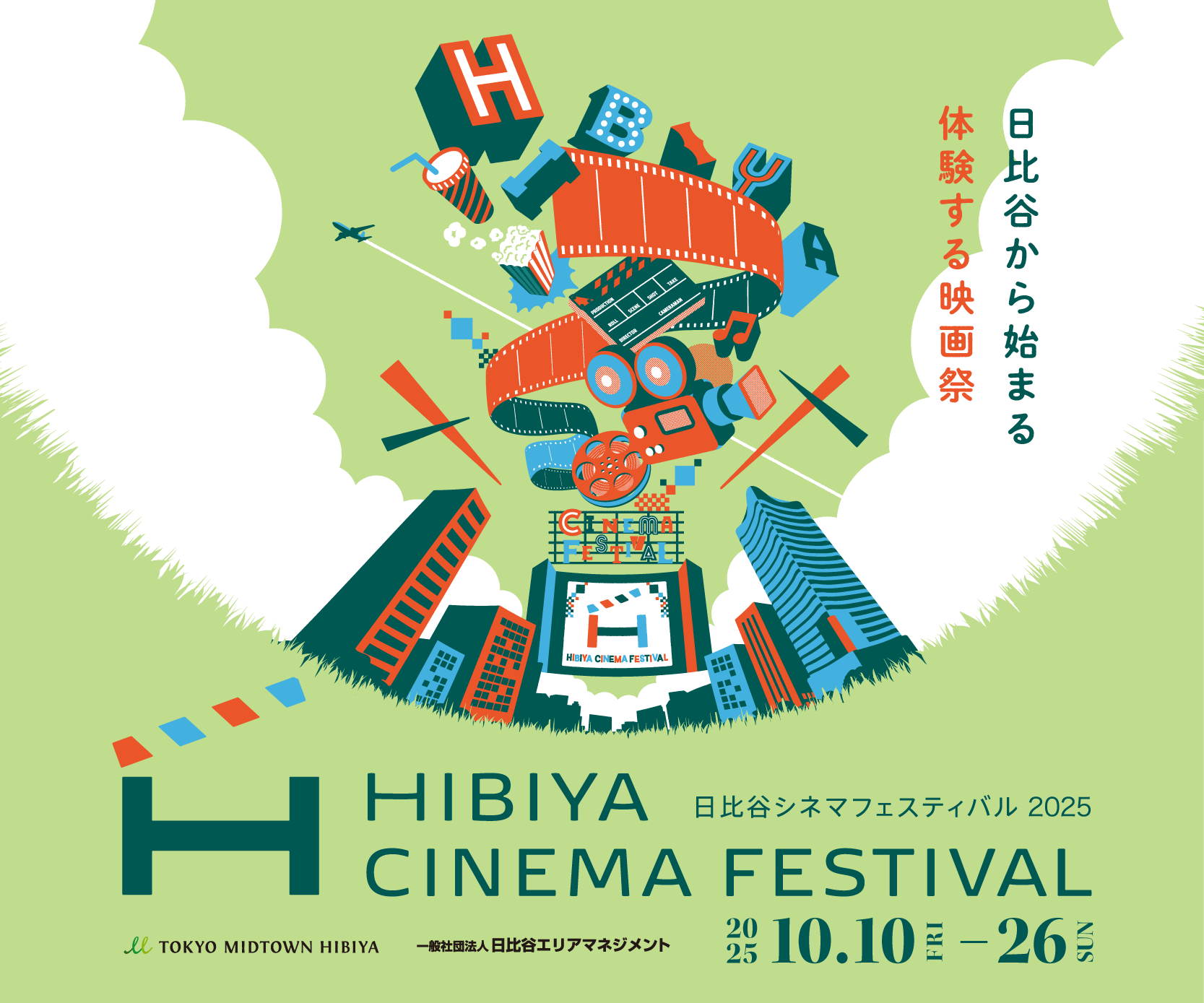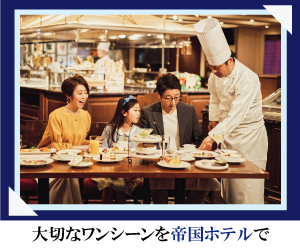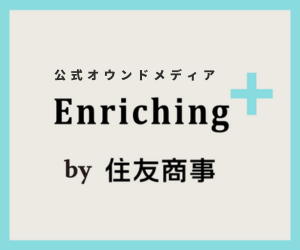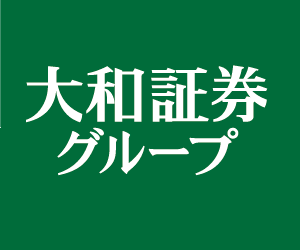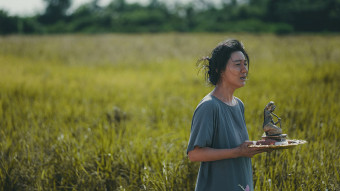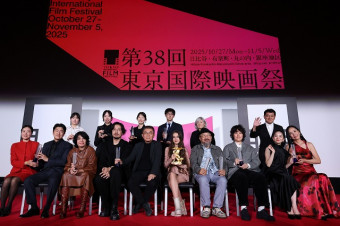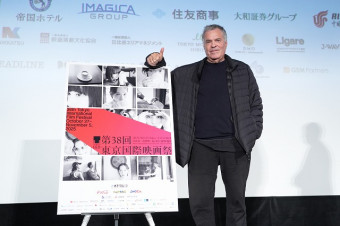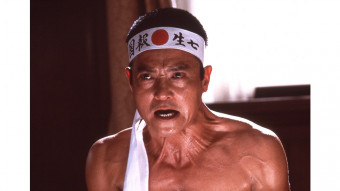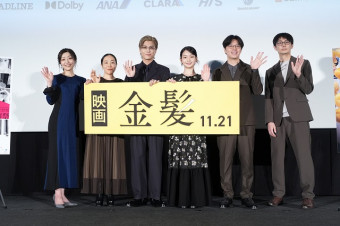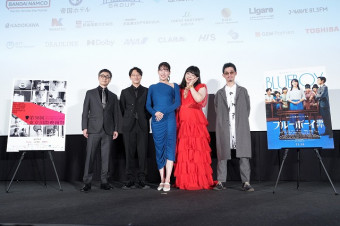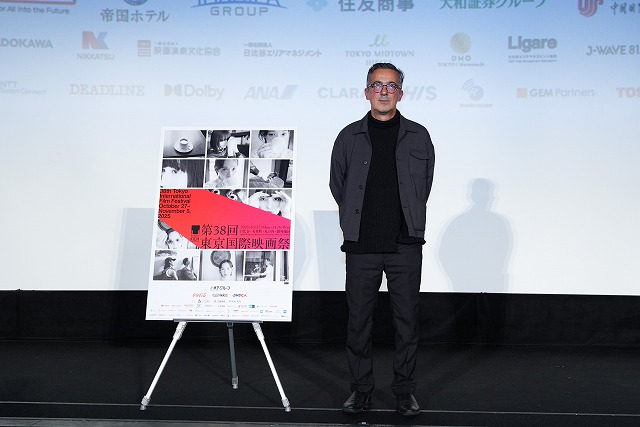
Producer Thanassis Karathanos fielded questions from TIFF Programming Director Ichiyama Shozo and the audience on October 31 following the Asian premiere of his energetic poultry fable, Hen, screening in the Competition section of the 38th Tokyo International Film Festival.
Pálfi György’s eccentric tale is narrated entirely from a hen’s point of view. Upon escaping during transport from a poultry farm, said hen fends off wild animals, speeding vehicles and pangs of hunger before taking up shelter in the courtyard of a former restaurant. The onetime eatery’s down-on-his-luck owner has let his daughter allow gangsters to use it as a space for smuggling and human trafficking. Our hen-oine navigates the space for her own purposes as well: trying to find a safe location to lay and then protect her eggs as she fights off the other animals and humans around her.
To accomplish the film’s many action scenes, the crew employed eight black-feathered hens (Eszti, Szandi, Feri, Enci, Eti, Enikő, Nóra, and Anett), all of them trained to play the lead role, along with two stunt hens who would perform difficult feats such as “jumping very high.” But Karathanos said the film’s challenges began even before the camera started rolling.
“When we started with financing,” he explained, “people didn’t believe we could make it with real animals. They thought we needed to use animation and visual effects.”
Fortunately, the filmmakers were able to employ the services of the talented Hungarian animal trainer Halász Árpád, who told the crew that it wasn’t just possible —but easy—to train chickens, “because actually chickens are super-intelligent animals.” This allowed the filmmakers to amazingly create the animal-centered drama without using any CGI.
Before shooting every day, the trainers and crew would gather to discuss which hen should play which scene, as Eszti, Szandi, Feri, Enci, Eti, Enikő, Nóra, and Anett each had special capabilities and tendencies. Karathanos said he was proud of the fact that the animals did not require any overtime, largely due to the calm shooting atmosphere the staff cultivated.
“This was important,” he expounded, “because we realized that when there was tension, the chickens could sense it and would not perform well.”
According to the producer, Pálfi is considered a “black sheep” in his native Hungary due to the “political situation with the right-wing government” and the director’s penchant for being “outspoken about the situation there.” Pálfi originally proposed that Hen take place in Mexico, but due to likely difficulties shooting with a European staff, Karathanos instead proposed that it be shot in his native Greece.
While lighthearted on its surface, Hen also has a darker plot that involves organized criminals exploiting the ongoing refugee crisis in Europe. The film becomes both a social commentary and a Greek tragedy, with desperate humans and hens searching for shelter in an unforgiving environment. This “symbiosis” between chicken and human is at the heart of the film’s drama.
“Both the hen and the humans are living parallel lives,” said Karathanos. “The humans don’t give a damn about the chickens, and we could say the same about the animals. But they both want a second chance.”
This “parallel” structure is evident in the film’s central drama between the owner, who is trying to re-open his restaurant, and the hen, who always has one reproductive goal in mind. This structure is most visible in a dynamic scene where a police raid upon the building is cross-cut with the hen frantically traversing the restaurant grounds to mate with a rooster.
“She’s a fighter,” explained Karathanos.
Karathanos relayed that Pálfi could not attend due to health issues but sent “his love” to the audience. The producer also apologized for the absence of another important guest.
“Unfortunately, the lead actress couldn’t join us,” he laughed.
Q&A Session: Competition
Hen
Guests: Thanassis Karathanos (Producer)














